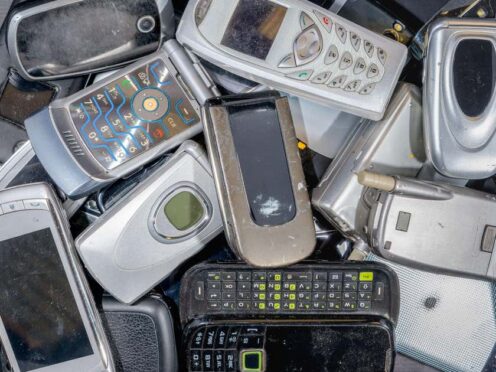
The Government is failing to fully grasp the “tsunami” of electronic waste in the UK, MPs have warned.
The Environmental Audit Committee (EAC) said there appears to have been little progress over the last few years and no long-term delivery plan on Government ambitions to tackle the issue.
In a 2020 report, the committee warned ministers about the huge human and environmental impact of manufacturing electronic items, including the significant carbon emissions that are released into the atmosphere.
When not properly treated, e-waste can release toxic chemicals that damage human and animal health, the report said.
The EAC also outlined 27 proposals on reducing the amount of e-waste being produced in the UK and generating a circular economy.
These included measures like setting long-term targets that align with existing net zero commitments, online marketplaces being subject to producer responsibility requirements, banning the practice of intentionally shortening the lifespan of products, and the mandatory collection of e-waste.
The Government responded to the report in early 2021, accepting one of the recommendations and partly accepted 22 others, the EAC said.
Ministers have now launched an e-waste consultation, which includes a number of the EAC’s recommended measures.
But in a letter to Environment Secretary Steve Barclay on Tuesday, the committee said it is “disappointed” the Government is only now consulting on whether to implement a number of them three years later, while none have been fully delivered.
The committee said this slow progress does not display the urgency it had expected from a Government with plans to implement a wide-ranging resources and waste strategy.
The letter said: “We urge the Government to expand the scope of this consultation to ensure that the broadest possible proposals can be brought forward in order to move the UK to a zero-waste economy.
“This is particularly important in regard to the lifespan of technology, its engineered obsolescence, and encouraging repairability and reuse.”
Elsewhere, the committee said its members are concerned over the Environment Department’s (Defra) overall delivery on elements of the Resources and Waste Strategy, which have been “beset by delays”.
It cited past criticism levelled at Defra over its progress in implementing measures like waste tracking and giving assurance over moving forward with tackling textile waste.
EAC chairman Philip Dunne said: “When the committee reported on e-waste in 2020, each UK household had 20 unused electronic items hoarded at home, and there were enough unused cables in UK households to go around the world five times.
“Despite these extraordinary statistics, it appears the Government is yet to grasp fully the scale of the e-waste tsunami.
“It is not just the amount of waste created in the sector through planned obsolescence or insufficient recycling schemes, but the significant environmental impact of creating the products in the first place.
“The precious metals needed for our mobile phones, tablets or headphones are needed for net zero Britain and renewable energy infrastructure.
“As a select committee, we are encouraged when the Government looks carefully at the evidence we have collected and accepts our recommendations.
“However, four years on, we are yet to see many of these initiatives make it into policy or be reflected in its current consultation on e-waste.”
A Defra spokesman said: “Every year millions of household electricals across the UK end up in the bin rather than being correctly recycled or reused. This is a waste of our natural resources and has to stop.
“We are taking clear action on this issue – including proposals to make it easier to recycle and reuse unwanted gadgets and electricals and a ban on disposable vapes which represent a huge and growing stream of hard-to-recycle waste.
“We will continue to drive forward our ambitions to move to a more circular economy.”

Enjoy the convenience of having The Sunday Post delivered as a digital ePaper straight to your smartphone, tablet or computer.
Subscribe for only £5.49 a month and enjoy all the benefits of the printed paper as a digital replica.
Subscribe